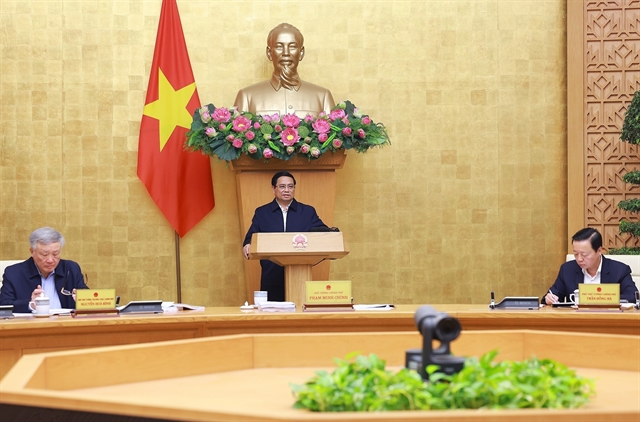 |
| Prime Minister Phạm Minh Chính addressed the January 2025 Government's law-building session in Hà Nội on Tuesday. — VNA/VNS Photo |
HÀ NỘI — Prime Minister Phạm Minh Chính has called for a shift in law-making process, stressing that laws should not only ensure effective governance but also foster openness and harness all available resources to facilitate national development.
At the conclusion of the January Government's law-building session in Hà Nội on Tuesday, PM Chính requested removing outdated mindsets, advocating for a break from merely prohibiting what cannot be managed or imposing control without deep insight into their effects.
On the draft revised Law on the Organisation of Local Governments, he stressed the urgency for clearer definitions of urban, rural, and island governance models, as well as the delegation of policymaking authority at various levels of the local administration.
Regarding the draft amended Law on Organisation of the Government, he instructed the drafting body to collect feedback from Cabinet members and align the draft law with the Constitution, especially those concerning the duties, powers and responsibilities of the PM, the Government and its members, as well as the relationships between the Government, the PM and the National Assembly, the Central Committee of the Việt Nam Fatherland Front, the Supreme People’s Court, and the Supreme People’s Procuracy.
Turning to the proposal to build the NA’s Resolution on addressing legal issues related to the organisational restructuring, the PM requested that it must be submitted to the Government by January 14 and presented to the 15th NA’s extraordinary meeting next month for consideration.
The resolution must be comprehensive, ensuring seamless post-restructuring operations and establishing a cohesive legal framework that addresses all relevant aspects. Throughout the drafting process, regular and close coordination with relevant NA agencies is a must to meet quality and deadlines, he said.
With four draft laws and three important resolutions slated for submission to the NA’s upcoming extraordinary meeting, ministers and heads of ministry-level agencies were urged to allocate maximum resources and personally oversee the finalisation of these documents.
The PM ordered the continued review of existing legal documents to identify and rectify issues and shortcomings, calling for the elimination of any mechanisms based on favouritism or undue discretion, fight against corruption, negative phenomena, and vested interests in the lawmaking process, while minimising administrative burdens and compliance costs for citizens and businesses.
He also called for application of scientific and technological advances and digital transformation to reduce petty corruption.
Drafting agencies were tasked with continuing consultations with stakeholders, relevant agencies, scholars and experts, while considering international best practices and promoting effective policy communication, particularly on new and complicated issues. — VNS
(责任编辑:Cúp C1)